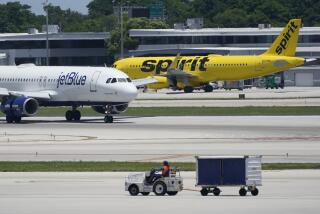FCC report criticizes AT&T bid to take over T-Mobile
Federal regulators allowed AT&T Inc. to withdraw its proposed $39-billion takeover of T-Mobile USA from their approval process, but they also dealt a further blow to the teetering deal.
The Federal Communications Commission released a 157-page report Tuesday detailing the agency’s staff findings that the purchase was not in the public interest.
The staff report concluded that the combination of two of the nation’s largest wireless providers — AT&T ranks second in subscribers and T-Mobile is fourth — would harm competition through “an unprecedented increase in market concentration.”
And it would lead to higher prices. The report suggested that consumers nationwide could pay as much as 6% more a year, on average, through 2015, with larger increases in Los Angeles, San Francisco, New York City and other major metropolitan areas.
In addition, the report found that the deal would not fulfill AT&T’s public claims of widespread benefits for consumers, including expanded high-speed Internet access and 55,000 to 96,000 direct and indirect new jobs.
Opponents of the deal cheered the decision to release the staff report.
“AT&T has built its political campaign for approval on the false notion that buying T-Mobile would somehow create rather than destroy jobs,” said Andrew Jay Schwartzman, policy director for Media Access Project, a public interest law firm. “The FCC’s evisceration of these claims is especially welcome.”
AT&T objected to the release of the staff report, which it said has not been approved by the commissioners and which the company has not had the opportunity to rebut.
“It is simply a staff draft that raises questions of fact that were to be addressed in an administrative hearing, a hearing which will not now take place,” said Jim Cicconi, AT&T’s senior executive vice president for external and legislative affairs.
“It has no force or effect under law, which raises questions as to why the FCC would choose to release it.”
Nevertheless, FCC officials said they will provide their staff analysis to the Department of Justice, which has sued to block the acquisition on antitrust grounds.
“Our review of this merger has had a clear focus: fostering a competitive market that drives innovation, promotes investment, encourages job creation and protects consumers,” FCC Chairman Julius Genachowski said. “These goals will remain the focus if any future merger application is filed.”
The staff report found that AT&T’s model for arguing that the combined company would produce lower prices was flawed. With the FCC staff adjusting the model to correct some errors, the report showed that prices could rise every year through 2015.
The staff, however, cautioned that its revised AT&T model shouldn’t be used to predict that prices would rise an average of 6% a year but rather that “the evidence applicants submitted cannot be relied upon to show that the proposed transaction is in the public interest.”
Consumers would see prices rise mainly because of the dominance of AT&T, which would become the nation’s largest wireless carrier, and the current No. 1, Verizon Wireless, the FCC analysis said. AT&T and Verizon combined would have 75% of wireless customers and account for more than 75% of the industry’s revenue.
The report, based on more than 200,000 pages of documents, also found that AT&T’s job claims were “inconsistent with AT&T’s internal analyses” about cost reductions from the acquisition.
The report said there was “no dispute that the proposed transaction will result in fewer total direct jobs” at AT&T and likely would lead to indirect job losses because the companies would invest more in their networks if they remained separate.
The FCC staff also determined that the purchase of T-Mobile was not essential to AT&T expanding its next-generation wireless network to 97% of Americans.
Genachowski signaled last week he opposed the deal when he moved to seek a hearing and review by an administrative law judge — the steps the agency takes to oppose a transaction.
In light of that, AT&T and T-Mobile’s parent company, Deutsche Telekom of Germany, said Thursday that they intended to withdraw their FCC application to focus on winning the antitrust suit filed by the Justice Department to block the deal.
Both the FCC and the Justice Department must approve the purchase.
AT&T can reapply for FCC approval if it wins the suit or reaches a settlement, such as an agreement to divest a large number of T-Mobile’s subscribers to another competitor.
But the usual six-month review would start over from the beginning, FCC officials said. Genachowski said that any revised bid for T-Mobile would have to show that competition in the wireless market would not be harmed.
Times staff writer David Sarno contributed to this report.







